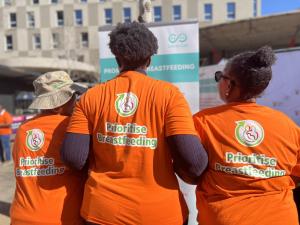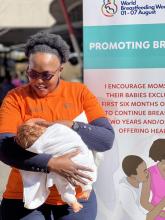Prioritize breastfeeding and create sustainable support systems: World Breastfeeding Week represents a critical moment to champion breastfeeding as fundamental to children's survival, growth and healthy development
Pretoria—Breastfeeding is crucial as it is a baby's first vaccine, providing essential protection from diseases and supporting brain development. There is clear and compelling evidence that a decreased or lack of breastfeeding can seriously contribute to poor health, growth and development as well as the survival of infants, children and mothers.
Despite its proven benefits, the 2024 Food and Nutrition Security Survey National report revealed that the proportion of infants under six months of age in South Africa that were exclusively breastfed decreased to 22% in 2024 from 32% in 2016. With these concerning figures, the country will not reach the Sustainable Development Goal (SDG) target of an exclusive breastfeeding rate of 50%.
The United Nations Children’s Fund (UNICEF) and the World Health Organization (WHO) recommend that breastfeeding should be initiated within the first hour after birth, continued exclusively for the first six months of life and continued alongside healthy, safe and adequate complementary foods from six months, and continued up to two years or beyond.
From workplace support to public awareness campaigns, from research to advocacy to community and healthcare support, UNICEF's and WHO’s policies and initiatives have had a significant impact on breastfeeding mothers worldwide. However, breastfeeding can be challenging when parents are not fully supported, and Breastfeeding Week reminds us that more needs to be done. It is thus fitting that the theme for Breastfeeding Week 2025 is “Prioritize Breastfeeding: Create Sustainable Support Systems."
Sustainable support systems’ mean that mothers get the help they need, when they need it and wherever they are – at work, at home or in their community.
The 2025 theme focuses on our role as society in promoting breastfeeding to foster a sustainable environment while mitigating the effects of climate change. The reality is that breastfeeding is a truly sustainable solution that is good for the planet and its people. It is also evident that prioritising and supporting breastfeeding will reduce the growing pollution, packaging and waste of the infant formula supply chains.
To ensure that every child benefits from breastfeeding, UNICEF and WHO call on government, the corporate sector and all other partners to create sustainable support systems that prioritize breastfeeding through adequate policies, programmes, and funding.
This includes the following:
- Strengthen breastfeeding support in healthcare facilities by equipping healthcare workers with knowledge and skills to support breastfeeding from pregnancy through early childhood. Healthcare workers play a critical role in supporting breastfeeding, but many lack the tools, time and training to provide adequate care. Skilled counselling from trained, empathetic healthcare workers from pregnancy throughout the breastfeeding journey makes a meaningful difference.
- Promote workplace policies and environments that protect the rights of mothers and make breastfeeding easy and accessible for families.
- Integrate breastfeeding counselling and support into routine maternal and child health services, including antenatal, delivery, and postnatal care.
- Strengthen community health care systems to provide ongoing, accessible breastfeeding support. This support can significantly reduce the risk of diseases like diarrhea and respiratory infections in infants.
- Encourage families and friends to play a role in supporting breastfeeding mothers and make them breastfeed anywhere and anytime
- Protect breastfeeding from the marketing tactics of the formula milk industry.
- Ensure that South African regulations relating to Foodstuffs for Infants and Young Children (aka R991) are updated and fully aligned with the International Code and subsequent World Health Assembly Resolutions.
These efforts collectively contribute to higher rates of breastfeeding, which in turn leads to better health outcomes for both mothers and children. UNICEF and WHO will continue to work with government and various stakeholders to ensure that every child has the best start in life with breastfeeding which is a proven natural, safe, nutritious, and sustainable source of good nutrition for children.
Breastfeeding Week reminds us that when these elements work together across all levels of healthcare, they create a safety net that ensures that no mother must navigate breastfeeding challenges alone.
By Shenaaz El-Halabi, World Health Organization Representative South Africa and Christine Muhigana, Representative, UNICEF South Africa

